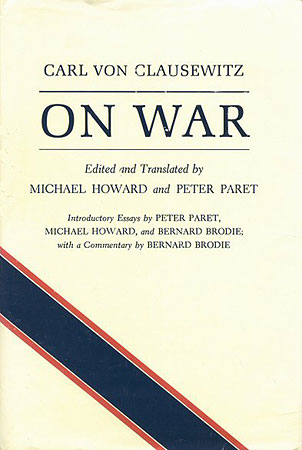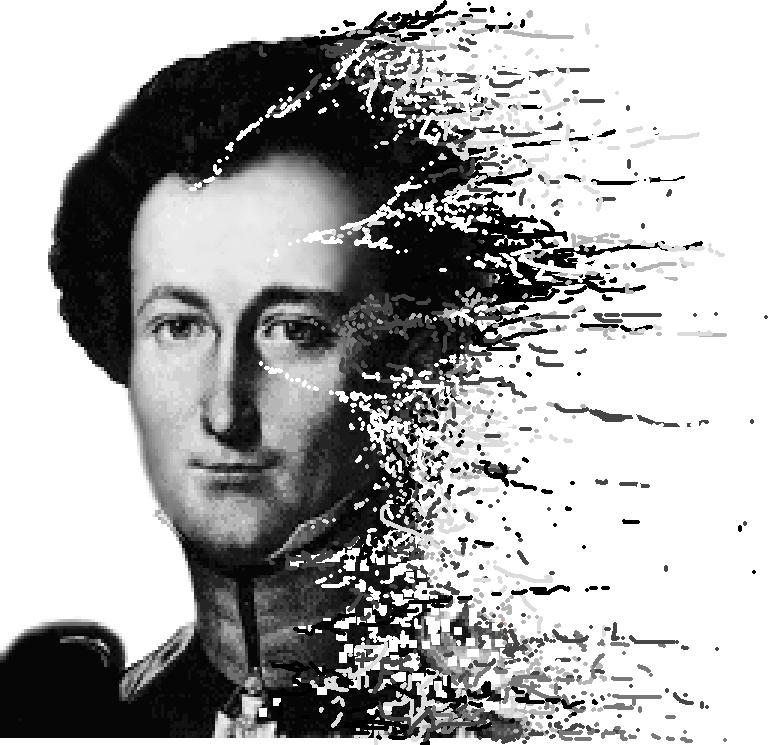On War as an Unfinished Symphony
On War by Carl von Clausewitz has been the most influential book on strategy and war of all time.
We can say this because On War is the standard by which all other works of strategy are measured and only a few compared – notably Sun Tzu’s Art of War and The Peloponnesian War by Thucydides. The odd thing is that we can say this despite the fact that On War is more frequently shelved, cited or understood secondhand rather than read, even by military professionals. And furthermore, within the narrow demographic that reads Clausewitz seriously and critically, there can be heated dispute over what he meant, due to the difficulty of the text. Then there are the secondary effects, historical and military, of Clausewitz having been misunderstood, forgotten, ignored or at times, his strategic philosphy consciously rejected.
The shadow cast by On War is all the more remarkable given it’s circumstances of publication. Clausewitz died in 1831, at fifty-one, of  cholera, having finally risen to a military post his talents merited. He had been writing On War since 1816 and it was far from completed or refined to his satisfaction and it is highly unlikely, in my view, that Clausewitz would have consented to it’s publication in the condition in which he left it. His determined and intellectually formidible widow, Marie von Clausewitz, further shaped the manuscript of On War, guided by her intimate knowledge of her husband’s ideas and was likely the best editor Clausewitz could have posthumously had.
cholera, having finally risen to a military post his talents merited. He had been writing On War since 1816 and it was far from completed or refined to his satisfaction and it is highly unlikely, in my view, that Clausewitz would have consented to it’s publication in the condition in which he left it. His determined and intellectually formidible widow, Marie von Clausewitz, further shaped the manuscript of On War, guided by her intimate knowledge of her husband’s ideas and was likely the best editor Clausewitz could have posthumously had.
Nevertheless, to my mind On War remains a magnificent unfinished symphony.
What would On War have looked like if Clausewitz had lived another twenty-five or thirty some years? Assuming continued good health, Clausewitz would have seen, perhaps commanded in, the First Schleswig War and at least studied the Crimean War from afar. He would have had another quarter-century of reading and mature reflection on his subject. Clausewitz, who had a keen understanding of history, would have also witnessed the grand European upheaval of liberal revolution in 1848 that rocked the Hohenzollern monarchy to it’s core. What new insights might Clausewitz have gleaned or expanded upon? Would his later chapters On War have evolved to equal the first?
Having outlived Marie (who died in 1836), would Clausewitz have become a deeply changed man?
What I find it difficult to believe is that Clausewitz, with his creatively driven and philosophically exacting mind, would have been content to let the manuscript of On War rest where it stood in 1831. Or that we read today what Carl von Clausewitz ultimately intended.




November 3rd, 2011 at 12:36 pm
Nice post Zen.
A few points:
First, Clausewitz would probably never been completely satisfied with this work. There would have always been something missing, some last refinement necessary, some insight either missing or not clear enough . . . This is something common among theorists I think – Max Weber is another case in point, most of his works used and discussed today were posthumous works published by his widow.
That said, On War, does contain an adequate formulation of at least three types of theory: The General Theory of War, Clausewitz’s Art of early 19th Century Warfare, and Clausewitz’s Theory of Political "Development"; that along with an approach to strategy by way of praxis and strategic theory. Quite an achievement, and almost 200 years later we’re still waiting for the second best attempt in this regard.
Finally, what changes in his view would Clausewitz made had he lived longer and experienced more wars? What gave Clausewitz many of his most important insights imo (and this is not only my opinion), was that he experienced war during a period of profound political change. The old form of 18th Century warfare and political systems gave way to the dynamic changes ushered forth by the French Revolution. It is during times like these that war’s nature undergoes a broadening, for lack of a better word.
Could Clausewitz have lived long enough to experience a second such political upheaval? What was the next political upheaval that changed warfare fundamentally?
November 3rd, 2011 at 3:04 pm
" What was the next political upheaval that changed warfare fundamentally?"
World War I was the culmination of several trends that led to a fundamental change in warfare. He would not have lived long enough to see it.
The 19th Century wars only suggested the direction it was going. I think he may have gotten interested in the maritime and extra-European dimensions if he had lived a few more decades, but that is a pure guess. I think what he did finish is so good that I can’t regret very much that he did not get more time to tinker with it.
November 3rd, 2011 at 7:06 pm
Hi Gents,
.
A point, if I may, in response to Seydlitz.
.
As we are trying to hazard out what CvC might have seen if he had lived longer, our natural tendency is to extrapolate on what he had written in On War. This is reasonable, because a major event like 1848 would have expanded Clausewitz’s understanding of the phenomena of political revolution, which he already understood from a certain perspective – a foreigner facing the onslaught of French armies. Being a member of the government elite at the center of a revolution is a different experience and would probably have led to tweaking or extension of his political thinking.
.
That said, what made CvC distinctive, was his capacity to see and articulate things no when else did. We can’t predict what any new insights of his would have been that no one else has conceived of, only that Clausewitz had demonstrated that ability to do so and might very well have had some.
.
It is also possible, I would allow, that he might have fruitlessly chased a grander level of theory like Einstein did with unified field, that would have come to nought.
November 3rd, 2011 at 10:34 pm
Zen-
a major event like 1848 would have expanded Clausewitz’s understanding of the phenomena of political revolution, which he already understood from a certain perspective – a foreigner facing the onslaught of French armies.
I think this very much the usual view of Clausewitz, but if we consider the actual history of his times . . . Clausewitz saw "people’s war" as the actual response to the French onslaught. that is the only effective way to counter the French challenge was to mobilize the nation, as in Landsturm . . . in 1848 which side of the barricades would he have been on . . . ?
Tauroggen?
Consider for instance this . . .
http://www.clausewitz.com/readings/Daase/SmallWarsPaper.htm
Also Carl Schmitt’s Theory of the Partisan is very much in the same vein . . .
Nice discussion.
November 4th, 2011 at 7:25 pm
The Daase article is very good. It is long past time for the total corpus of Clausewitz’s work to be translated into English. Somewhere in the trillions of dollars we spend on national defense we could spend a few million setting up an institute to oversee this project, to equip ourselves with "intellectual ammunition" to supplement, or give meaning to, our various wunderwaffe. Daase may be correct that examining Clausewitz’s untranslated material gives a fuller picture of his thoughts on people’s war. But On War itself has quite a bit on the subject, as I noted during the roundtable. The idea that Clausewitz’s thought is somehow outmoded due to current conditions is deeply erroneous — and usually propounded by writers whose envy of Clausewitz’s eminence is a strong motivating factor for their spurious claims.
November 4th, 2011 at 10:23 pm
Lex-
Very much agree, especially in regards the spurious claims, but Clausewitz’s being the political theory of war always brings up very uncomfortable questions . . . that seemingly those in power would rather leave unasked, let alone having to provide an answer to . . .
November 5th, 2011 at 5:50 pm
To the best of my knowledge the First Book is written in the final essence. When he started to write he was in a pre Napolonic thinking template, and it took him sometime to understand the levee en mass , the citizen as the defender of HIS country. Before it had been just the king`s (or what ever emperor)…. he started to rewrite all of conceptc but died shortly to early!
November 6th, 2011 at 3:39 pm
Does Marie vonC have her own body of writings? I read her introduction on the Clausewitz-to-com website. Charming. Heartfelt. And yes, intellectually formidable indeed.
November 6th, 2011 at 5:26 pm
Good question Doc Madhu. I don’t know the answer to that. It was highly atypical for upper class European women in early mid-19th century to engage in public discourse – in many ways the 18th century and ancien regime had been freer (at least if you were wealthy and of aristocratic lineage). The US showed the same social conservatism after 1820 but for a different reason ( evangelical revivalism and the bourgeois "cult of domesticity" – though in 20 years it led to female public activism in abolition, temperance, suffrage and other reform movements)